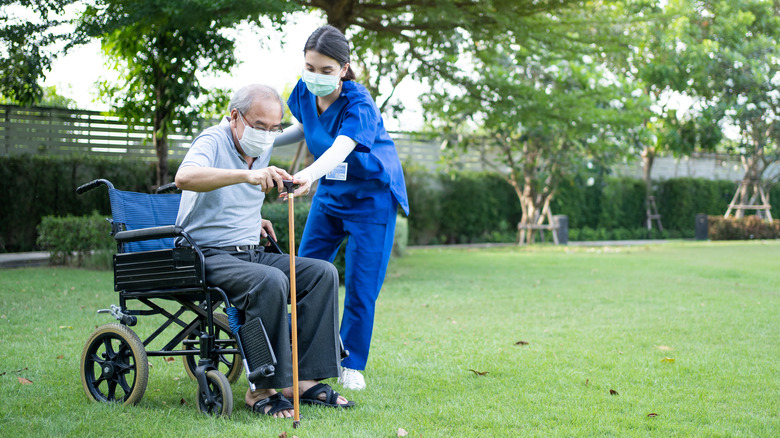How Occupational Therapy Could Help Those With Long COVID
Characterized by ongoing feelings of extreme tiredness, people with chronic fatigue may feel as if they've just pulled an all-nighter, no matter how thoroughly they may have slept the night before (via WebMD). Often impacting one's ability to function, fatigue has been among the most commonly reported symptoms of long COVID, along with brain fog and shortness of breath, reports HealthDay.
"Some people experience total wipe out and don't have the energy to get dressed, others have COVID brain fog and can't think clearly in work or figure out bus time tables. Some people have a mixture of both physical fatigue and cognitive fatigue at different times of the day," says Louise Norris, lead researcher on a new long-haul COVID-19 study (via HealthDay).
In an effort to help relieve patients of these long-term symptoms, researchers from St. James Hospital and Trinity College in Ireland conducted two different studies exploring how clinical interventions such as occupational therapy, virtual exercise classes, and stress management instruction affected participants coping with symptoms of long COVID, notes HealthDay.
The health benefits of energy conservation techniques
While yet to be peer-reviewed, preliminary study findings were presented at the annual meeting of the European Congress of Clinical Microbiology & Infectious Diseases (via HealthDay). In the first study involving over 50 patients experiencing chronic fatigue as a result of long COVID, participants underwent three 1.5-hour group occupational therapy sessions conducted online over the course of four weeks. Focusing on energy conservation techniques, the sessions were designed to identify patients' cognitive and physical movement limitations to develop techniques specific to each individual's needs in order to help them tackle everyday activities such as grocery shopping.
Along with decreases in fatigue, study findings showed that patients also experienced a boost in life satisfaction following the study. "At the end of the program, people subjectively felt they could control their fatigue levels on their own," lead researcher Louise Norris states via HealthDay.
Over the course of six weeks, the second study involved 60 long-haul COVID patients who underwent two 50-minute online exercise classes each week in which the activity level slowly but progressively intensified. Patients reported improvements in respiratory symptoms as well as stamina, with the first 40 participants found to have increased their walking distance by an average of 34%, reports HealthDay. While decreases in fatigue were reported in over 70% of patients, more research is needed.


